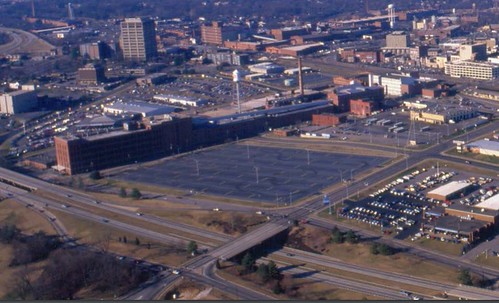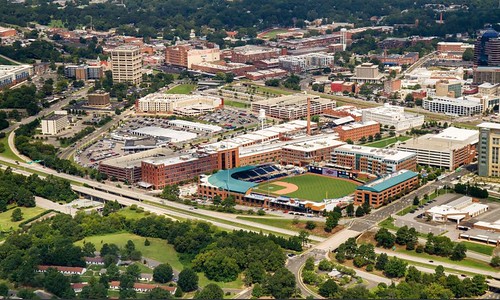Should small city economic development over minor league baseball and other sports be treated differently from big city cases?
Potomac Nationals move to Fredericksburg. In the DC region, the Potomac Nationals minor league baseball team affiliated with the Washington Nationals will be moving from Prince William County to Fredericksburg, Virginia, because the team owner couldn't get a deal with the local government and the team had been served notice by its league that it had to develop a new stadium by a certain date ("Fredericksburg approves Potomac Nationals new stadium, Washington Business Journal").
Pawtucket Sox move to Worcester. Separately, the Pawtucket Sox, affiliated with the Boston Red Sox, after many years of trying to develop a new stadium, in part with state subsidies and loan guarantees, decided to move to Worcester, Massachusetts, because of the inability to get a bill through the Rhode Island State Legislature. (Technically a bill was passed, but with a provision that made the law a deal killer.)
The Diamond, Richmond. Wikipedia photo. Compared to Greensboro, the current stadium location is not in the core ofthe city but more on the outskirts.
Richmond's tried for years to build a new minor league baseball stadium. Richmond, Virginia has been going back and forth for years about building a new minor league baseball stadium too ("A new baseball stadium is striking out in Richmond," Washington Post; "Editorial: Can big, beautiful RVA arena lead to a new park for the Flying Squirrels?," Richmond times-Dispatch). Among other things, delays led to a loss of one team affiliated with the Atlanta Braves and a gap without a team, before landing a new one.
One of the problems is the complicated political structure in Virginia. As a city, Richmond is disconnected from counties, and the Richmond Metropolitan Authority funds cross-jurisdictional infrastructure, but it's difficult to get the counties to agree to pay towards a facility wholly within Richmond.
Louisville. Louisville has a minor league stadium on the waterfront, and it was a key element of the downtown revitalization program there ("Waking Up Louisville's Downtown," New York Times; "A closer look at the ACC baseball tournament – is it really a 'multimillion-dollar gift' to Louisville?," Louisville Courier-Journal).
Fluor Park at the West End, Greenville, SC. Wikipedia photo.
Greenville, SC. Greenville is a small city revitalization success story ("Liberty Bridge, Falls Park transformed downtown," Greenville News, "Opening the Gate to a Vibrant Main Street in Greenville, S.C.," New York Times).
It took a few planning iterations before elected officials and stakeholders accepted the idea put forth by planning consultants that instead of hiding a waterfall placed downtown, they should show it off, which they did by removing a road bridge that obscured it.
Once they did, in 2004, the downtown became a destination, and the city continues to build on and extend that success with other elements, including the West End Field minor league baseball park located downtown, which opened in 2006.
Note how the minor league baseball stadium in Greensboro is embedded in the center of the city. How cool is that?
Greensboro, NC. What really got me to thinking about this was a few years ago, in an interview with an economic development official in Greensboro, NC (for pieces related to colleges as economic drivers, they do some amazing stuff in Greensboro), we argued for a moment about how his foundation provided $25 million towards a minor league stadium ("How other cities have funded baseball stadiums," Wilmington Star News; "Ballpark money from Bryan fund?," Greensboro - Triad Business Journal).
Are minor league stadium matters worthy of deeper academic study? But since, I've wondered if I was too doctrinaire. That perhaps community considerations need to be outlined and weighed differently than how I look at it for big cities (see my big city sports facility evaluative framework here). Just as I argue for a more nuanced look at the issues for cities--all the while angling for the best deal for the community as opposed to the team owner--the same goes for small cities.
When so many smaller communities are "hollowing out," minor league baseball as well as college sports and other events can be important community anchors. And I remember how a minor league stadium project in Memphis won an award from the Congress for New Urbanism back in 2002, partly because it anchored a new ballpark district, with additional mixed use development.
I think the issue of minor league stadiums in smaller cities is worthy of a separate vein of academic research, separate from that on the impact of professional sports teams in large metropolitan areas, which comprises a majority of the studies in the field. Note that this is different from spring training sites too. (In the DC area, there are also minor league teams in Bowie, Frederick, Hagerstown, and Waldorf, Maryland, as well as teams elsewhere in Virginia and Maryland. The main minor league team for the Washington Nationals is in Harrisburg, Pennsylvania, which is within driving distance.)
Note that isn't just for baseball. Also for soccer ("Louisville City FC stadium isn't only Butchertown project," Louisville Courier-Journal"), and college facilities--Baylor's football stadium used local funds and maybe some of the money for the University of Washington football stadium in Seattle too.
And I also remember issues concerning minor league baseball in Brooklyn and Staten Island, where there are active teams in facilities partly funded by the city and state. So it can be a bigger city issue also, but usually with special considerations. Outside of NYC, I don't know of examples of minor league teams also located in the same city alongside major league teams.
Pawtucket. The Providence Journal has been covering the Pawtucket stadium proposal for years, and in the face of the loss of the team, published an analysis, "How Rhode Island lost the PawSox."
It's a great, thorough piece and it discloses something that I didn't know, that because of problems with previous stadium proposals as well as the loss of millions of dollars of public money on former Red Sox pitcher Curt Schilling's failed video game venture, Senator William Conley, chair of the Senate Finance Committee, decided to hold hearings around the state, the lengthening the process, but to truly gauge citizen sentiment on whether or not to support public funding.
Such a hearing process is almost unprecedented and a real statement of leadership.
At the hearings, 70% were in favor, and in terms of online submitted comments, 60% were in favor. Conley moved the project forward in the Senate, but key officials in the State House balked, and the project sputtered, leading the team to decamp.
Probably the hearings run by the Senate should have been held jointly with the State House, thereby developing consensus across the Legislature.
According to the article, while Senate participants in the process believed their concerns were addressed and the project had statewide support, House members did not, and because they hadn't run a thorough public process of their own, they believed that a majority of their constituents were opposed.
Interestingly, during the public process a number of interesting proposals were raised, and some were incorporated into the final legislation, such as:
... steering half the annual naming rights, $250,000, to Pawtucket to help keep up with the city’s share of bond payments. The bill also added an assessment on premium tickets for the same reason. And DiPalma liked the team’s added pledge to build 50,000 square feet of commercial development near the park.Plus, the original deal negotiated by the Governor and the Mayor of Pawtucket got the team up to providing 54% of the cost of the stadium + any overruns, which according to Senator Conley, was significantly higher than was typical for other minor league stadium deals.
With the disagreements among elected officials and a reticence to advocate for it, especially when political opponents criticized support, the legislation wasn't moving in Rhode Island.
Not unlike how I argue that Bilbao was prepared and seized the opportunity, "pouncing" on the Guggenheim when the Austrian city that they approached first backed out ("Why can't the Bilbao Effect be reproduced?"), during the process Worcester approached the team's ownership with a proposal and relatively speaking, unanimous support. From the article:
When the Worcester City Council voted in December of 2016 for Ed Augustus to try to lure the PawSox, he was sure there was no chance.Postcard produced by the Worcester Canal District Association promoting support for moving the Pawtucket team to a new minor league stadium in Worcester.
But as city manager, he was Worcester’s CEO, and his “board” had just given him a mission.
So Augustus chatted about it with Joe Petty, the part-time mayor, and the two were soon wondering if it was worth the time. “Long shot” was an understatement.
“Well,” said the mayor, “give it your best.”
Once Pawtucket's period of contract exclusivity ran out, Worcester moved forward. As did many other communities.
But in Worcester, residents favored a stadium as a way to utilize 18 acres of land that was vacant and an eyesore and even developed a postcard campaign to communicate their support ("PawSox move to Worcester started with Gene Zabinski's postcard," Worcester Telegram).
And in the face of the death of the Rhode Island deal, Worcester eventually succeeded ("Worcester and PawSox sign letter of intent to build $90M stadium," Worcester Business Journal), in part because they started more than one year before all the other cities that contacted the team after it was clear that Rhode Island wouldn't provide bond loan guarantees.
=====
One element of the proposed Pawtucket deal needs to be adopted by other communities, charging a higher tax on premium tickets, suites, etc.
Downtown Durham, NC before the addition of a minor league baseball stadium

Downtown Durham, NC after the addition of a minor league baseball stadium

Labels: law and the legal process, legislative process, public finance and spending, sports and economic development, stadiums/arenas







0 Comments:
Post a Comment
<< Home